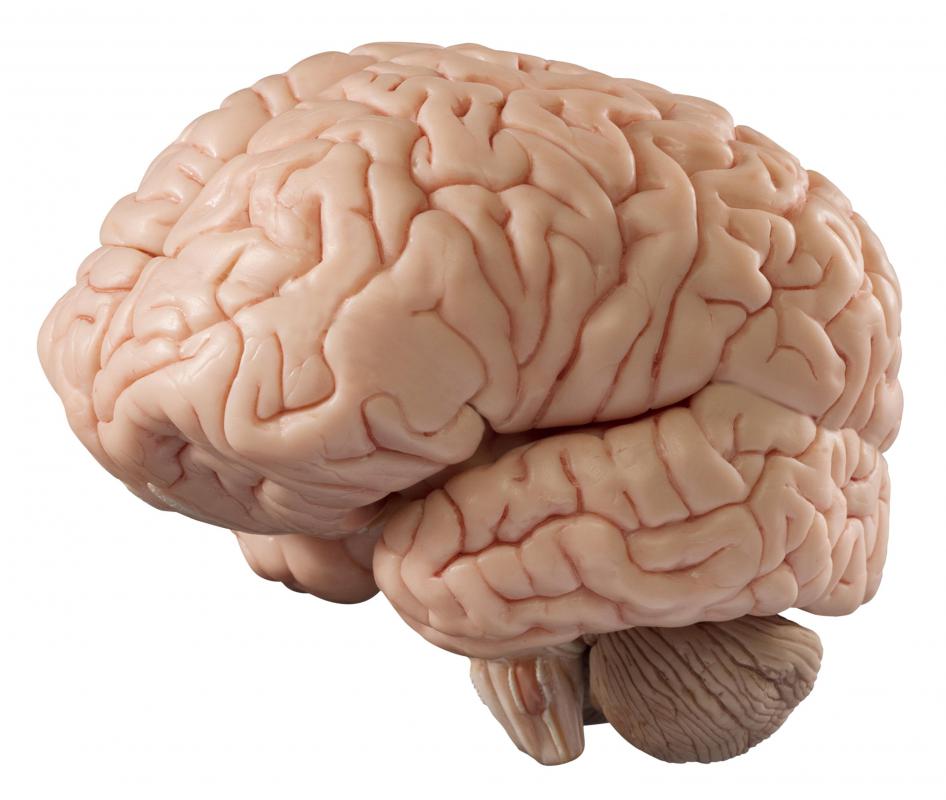At WiseGEEK, we're committed to delivering accurate, trustworthy information. Our expert-authored content is rigorously fact-checked and sourced from credible authorities. Discover how we uphold the highest standards in providing you with reliable knowledge.
What are the Causes of Brain Atrophy?
The potential causes of brain atrophy are numerous. In many cases, brain atrophy can be caused by some type of neurological disease, which is any disease affecting the makeup of the central nervous system. Brain atrophy is also sometimes caused by traumatic brain injury, such as injuries sustained in a car accident. Brain atrophy occurs when, for any reason, neurons, or brain cells, diminish or become ineffective, thereby leading to a reduction in brain tissue. Brain atrophy also is commonly known as cerebral atrophy.
There are hundreds of neurological disorders that could be listed as potential causes of brain atrophy. Some well-known examples include cancer, stroke, epilepsy, Alzheimer's disease and AIDS. Brain atrophy is, in fact, a kind of neurological disorder in and of itself, albeit a secondary condition brought on by preceding factors. Not all neurological disorders are sure causes of brain atrophy. Certain people can live with conditions such as epilepsy or multiple sclerosis, for example, without suffering from brain atrophy. Other neurological disorders affect the spinal cord or nerves without impairing brain function.

Some causes of brain atrophy are more rare, and therefore less well-known. Huntington's disease, for example, is a genetic disorder which causes brain cells to degenerate. Krabbe disease causes brain atrophy by attacking the myelin sheath that protects neurons.
Brain atrophy also can occur as a result of head trauma. Brain atrophy resulting from head injuries is often referred to as brain damage. In such cases, parts of the brain literally die off as a result of blunt force.

Brain atrophy often causes a range of secondary conditions and symptoms, such as dementia, seizures and aphasia. Individuals with dementia have difficulty remembering people, tasks and events, which often impairs their ability to work and socialize normally. Sometimes, the regression is so severe that it can even impair the person's ability to live autonomously. Dementia has various forms of severity: some forms are very mild and can easily be lived with; others, such as Alzheimer’s disease, are debilitating enough to require constant medical attention.

Seizures are convulsions caused by abnormal brain activity. Some seizures result from preexisting conditions such as epilepsy. Others, however, can be brought on by brain atrophy. Not all seizures are severe enough to cause significant harm, but some, such as grand-mal and epileptic seizures, can be quite dangerous.
One of the main symptoms of brain atrophy called aphasia occurs when areas of the brain that deal with language have been impaired. Affected individuals may have difficulty with speaking, reading and writing. Aphasia can cause individuals to speak nonsensically, as with Wernicke’s aphasia. In other forms, individuals retain the brain function that allows them to speak logically, but their speech is slower and more difficult. Such individuals usually are aware of their impairment, and often become understandably frustrated.
AS FEATURED ON:
AS FEATURED ON:
















Discussion Comments
I am a 30 year old female who is suffering memory problems and cognitive impairment. I am trying to persuade my doctor to send me for an MRI scan. I have been taking neuroleptics since the age of 18. I have heard that neuroleptics cause brain shrinkage, atrophy and many psychiatrists have confirmed this.
I was never given a diagnosis, but the psychiatrist who saw me kept insisting I keep taking it. I am trying to withdraw from the medication now and I am really suffering. I have headaches, I cannot coordinate, I have been losing my memory drastically and cannot function. I refuse to give up and will insist on tests, but what I would like to know is if atrophy is reversible or not. Please help.
I'm not a doctor, but from what I've learned, yes it can. Atrophy can be caused by several things, one of them being severe brain injury.
I just learned my 39 year old boyfriend has brain atrophy. The only logical explanation is all the fights he's been in. Very sad disease.
Can continuous physical abuse by kicking someone's head cause brain atrophy?
Post your comments